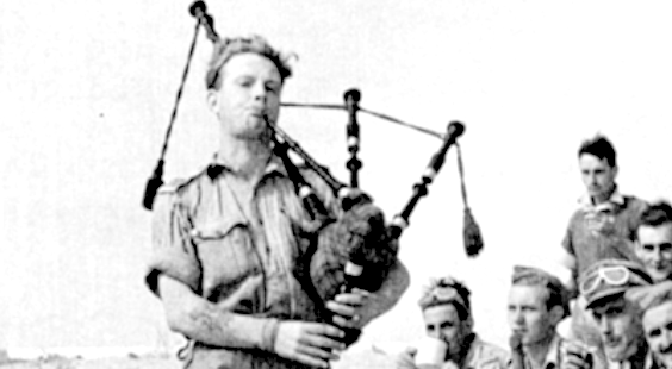
There was piping activity in the POW camps and this was supported by the pipers on the home front. Piping societies were raising money to send instruments to the prisoners and the monthly magazine Piping and Dancing encouraged readers to write to prisoners.
A member of the College of Piping Veteran’s Association, Sinclair Swanson, remembered his time as a prisoner: ‘My father was a piper in the first war and I was a piper from a boy. I served with the Royal Artillery and was taken prisoner at Mersa Matruh. I was a prisoner for three years.
By Jeannie Campbell
‘In one big camp I met a Scots Guards piper named Jock Munro but neither of us had instruments. One day we were walking around in the camp and we heard the sound of the pipes.
‘We followed the sound and eventually found the piper. We were listening and of course moving our fingers along with him so when he saw us he knew we were pipers. He was P/M Jackie Neill of the Queen’s Own Cameron Highlanders.
‘He said to come and have a blow anytime so the three of us shared the pipes. Then we heard there was an HLI piper in another hut. He had pipes but didn’t play them so I asked if I could have them. He said yes so I got them going and Jock and I would take turns of playing them.
‘We played for the different huts when asked. One time we were asked by the Canadians to play a request. The tune was the Rowan Tree so we played it with seconds.
‘Then they said come and meet the man who asked for it. We went in the hut and a man was lying in a bunk there. He had a full beard and his right arm was off. He had been a piper in the Canadian Scottish.
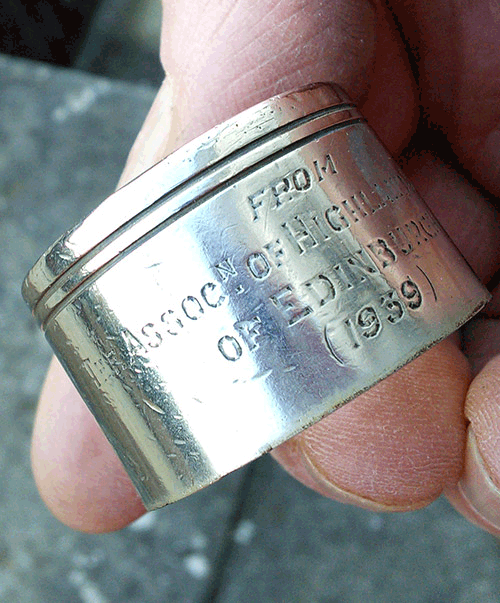
‘We were looking for a drummer and we found an Irishman to play the bass. Then we found a drummer from a bugle band. Eventually we got a Scottish drummer. We played the teams on for the Scotland/ England International football matches in the camp. The German officers all sat on the front rows to watch.’
In 1944 the Oban Times reported that in POW camp Stalag 383 there were no fewer than thirteen Pipe Majors. The Stalag 383 Piping Academy was set up and was equipped with ten sets of bagpipes supplied by home piping societies forwarded via the Red Cross and by friends and relations.
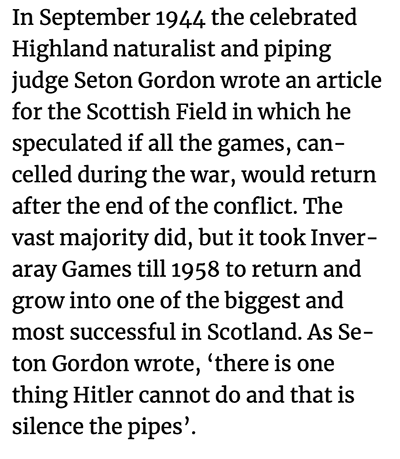
Drums were borrowed from the camp orchestra and a good pipe band was made. Practice chanters were also sent from Scotland and there was a learners’ class of thirty members all of whom were equipped with chanters.
Many more were keen to start learning so more chanters were needed. It is to be hoped that after the story appeared the Oban Times readership would have hunted out unused practice chanters to send to the boys in the camp.
Another camp with a pipe band was OFLAG Vll.B. A photograph of the band appeared in the Oban Times in September 1944. [If anyone has a copy please forward to PP.] The instructor and moving spirit behind the band was Lieutenant J. Hector Ross and the band had been equipped by the Association of Highland Societies of Edinburgh. One piping prisoner said afterwards that he always made a point of playing near the German guards, simply because he could see that it annoyed them.
- To be continued.
-
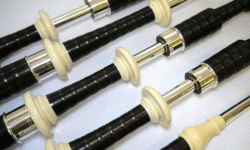 Bagpipes – DN4A – High Quality Set in Plain SilverPrice range: £200.00 through £2,052.00
Bagpipes – DN4A – High Quality Set in Plain SilverPrice range: £200.00 through £2,052.00 -
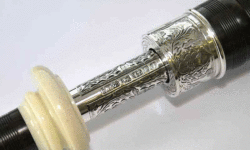 Bagpipes – DN5 – The Finest Bagpipe AvailablePrice range: £300.00 through £3,424.00
Bagpipes – DN5 – The Finest Bagpipe AvailablePrice range: £300.00 through £3,424.00 -
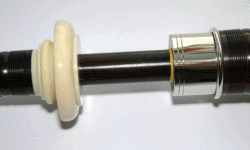 Bagpipes – DN1, High Quality InstrumentPrice range: £100.00 through £1,250.00
Bagpipes – DN1, High Quality InstrumentPrice range: £100.00 through £1,250.00
















Pleased to read this account of piping in the POW camps. I am just surprised to learn the Germans allowed such a patriotic calling to continue in the prison camps. All I know is from books and films but very surprised to learn that they allowed the prisoners to receive pipes and practice chanters from home. It seems so inconsistent with my picture of the German POW camps. This is fascinating stuff. Thanks for such interesting work.
Who knew? What a fascinating article (so far). By the way, please forgive me if I’ve not been attentive enough; but I have a question: Does Ms. Campbell have a book out with all these stories?